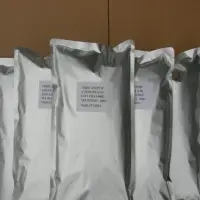-
Categories
-
Pharmaceutical Intermediates
-
Active Pharmaceutical Ingredients
-
Food Additives
- Industrial Coatings
- Agrochemicals
- Dyes and Pigments
- Surfactant
- Flavors and Fragrances
- Chemical Reagents
- Catalyst and Auxiliary
- Natural Products
- Inorganic Chemistry
-
Organic Chemistry
-
Biochemical Engineering
- Analytical Chemistry
- Cosmetic Ingredient
-
Pharmaceutical Intermediates
Promotion
ECHEMI Mall
Wholesale
Weekly Price
Exhibition
News
-
Trade Service
Laser interstitial thermal therapy (LITT) is a new method of minimally invasive treatment of intracranial diseases, and its adaptation and application are constantly expanding.
to protect the patient's nerve function, LITT can be an auxiliary treatment when the tumor is close to the functional area or deep.
previous reports show that LITT is safe and well-to-bear for malignant brain tumors.
Jianning Shao of the Lerner School of Medicine at Case Western Reserve University in Ohio, USA, and others conducted clinical studies using LITT to treat brain tumors, the results of which were published online April 2020 in World Neurosurgery.
The Cleveland Clinic began using LITT 10 years ago to treat lesions such as brain tumors.
authors divided patients treated with LITT between 2011 and 2018 into two groups: 100 patients in the early group from 2011 to 2014 and 138 patients in the most recent group from 2015 to 2018.
lesions treated with LITT, including gliomas (70.2%), radioactive necrosis (21.0%) and intracranial metastasis (8.8%) (Figures 1 and 2).
study compared demographics, tumor characteristics, surgical methods, and prognostics among patients in two queues.
1. Annual brain tumor statistics for LITT treatment.
collected as of mid-2018.
Figure 2. General classification of brain tumors treated with LITT.
of patients with brain tumors treated with LITT was 8.4 months, and 52% of patients developed the disease during follow-up.
30.2 per cent had short-term complications, 10.8 per cent had permanent dysfunction and had a total mortality rate of 2.16 per cent.
tumor location had no significant effect on total lifetime (OS) or progress-free lifetime (PFS) (P=0.13 and P=0.11, respectively).
in clinical prognostics, preoperative KPS score was 70, significantly associated with permanent dysfunction (P-0.001) and decreased total survival (P.001).
demographic data from the early and recent groups found that the average age of patients in the early group was 54.3 years, compared with 58.4 years in the recent group, with significant differences (P-0.04) and no significant differences in the rest.
in the past 2 years, the number of patients using LITT to treat radioactive necrosis has gradually increased.
the recent group had shorter surgical time than the earlier group (3.5h:6.6h; P.001);
multi-factor analysis showed that the duration of surgery after 2013 was significantly reduced (P 0.001).
Over time, as technology matured, the rate of permanent movement disorders decreased significantly (15.5 per cent: 4.4 per cent, P-0.005), and the 30-day mortality rate (4.1 per cent: 1.5 per cent) decreased, but the difference was not statistically significant.
the study showed that LITT micro-invasive ablation of intracranial target lesions, small damage to surrounding brain tissue, LITT effect and safety improved.
the study showed that patients with poor preoperative KPS scores did not use LITT well.
, as with other treatments, patient choice is critical.
: The intellectual property rights of the content published by the Brain Medical Exchange's Outside Information, God's Information and Brain Medicine Consulting are owned by the Brain Medical Exchange and the organizers, original authors and other relevant rights persons.
, editing, copying, cutting, recording, etc. without permission.
be licensed for use, the source must also be indicated.
welcome to forward and share.
.







